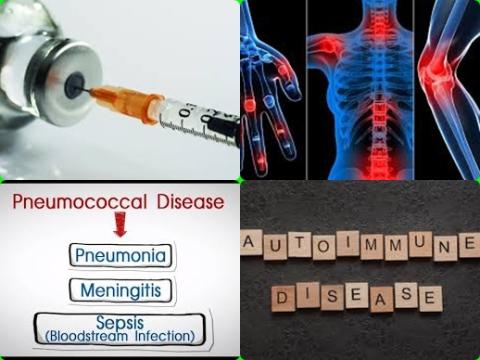
Objectives:
Patients with autoimmune inflammatory rheumatic diseases (AIIRD) are at increased risk of influenza, pneumococcal, herpes zoster and human papillomavirus infections, indicating the importance of their monitoring and use of vaccination to decrease the risk of these infections. Since 2009, a significant body of data has been published in the field of epidemiology of vaccine preventable infections (VPI) within autoimmune inflammatory rheumatic diseases population, including influenza, pneumococcal disease, herpes zoster, hepatitis B and human papillomavirus infection. However, no systematic literature review has been carried out yet. Therefore, this review article has been conducted.
Does vaccination decrease infections in patients with autoimmune inflammatory rheumatic diseases (AIIRD)?
Study design:
This review article included 63 studies (influenza (n=4), pneumococcal disease (n=7), hepatitis B (n=10), herpes zoster (HZ) (n=29), human papillomavirus (HPV) infection (n=13)).
Results and conclusions:
The investigators found an increased incidence of influenza and pneumococcal disease was reported in patients with autoimmune inflammatory rheumatic diseases.
The investigators found versus general population, patients with autoimmune inflammatory rheumatic diseases had a significantly increased risk of 190% [incidence rate ratio = 2.9, 95% CI = 2.4 to 3.3] for herpes zoster infection incidence.
The investigators found versus general population, patients with autoimmune inflammatory rheumatic diseases had a significantly increased risk of 410% [incidence rate ratio = 5.1, 95% CI = 4.3 to 5.9] for inflammatory myositis.
The investigators found versus general population, patients with autoimmune inflammatory rheumatic diseases had a significantly increased risk of 300% [incidence rate ratio = 4.0, 95% CI = 2.3 to 5.7] for systemic lupus erythematosus (SLE).
The investigators found versus general population, patients with autoimmune inflammatory rheumatic diseases had a significantly increased risk of 130% [incidence rate ratio = 2.3, 95% CI = 2.1 to 2.6] for rheumatoid arthritis.
The investigators found based on studies mainly conducted in the systemic lupus erythematosus population in Latin America and Asia, versus general population, patients with autoimmune inflammatory rheumatic diseases had a non-significantly increased risk of 60% [incidence rate ratio = 1.6, 95% CI = 0.7 to 3.4] for human papillomavirus (HPV) infection.
The investigators found pooled prevalence of hepatitis B surface antigen and hepatitis B core antibody in patients with autoimmune inflammatory rheumatic diseases was similar to the general population, 3% [95% CI = 1% to 5%] and 15% [95% CI = 7% to 26%], respectively.
The investigators concluded current evidence shows an increased risk of vaccine preventable infections in patients with autoimmune inflammatory rheumatic diseases, emphasising that prevention of infections is essential in these patients. In addition, it highlights the importance of the epidemiological research of the incidence and prevalence of vaccine preventable infections in patients with autoimmune inflammatory rheumatic diseases. The proposed research agenda, therefore, includes the collection of reliable epidemiological data using standardised methodology of disease rates and development of prevention and control strategies for infectious diseases in patients with autoimmune inflammatory rheumatic diseases.
Original title:
Incidence and prevalence of vaccine preventable infections in adult patients with autoimmune inflammatory rheumatic diseases (AIIRD): a systemic literature review informing the 2019 update of the EULAR recommendations for vaccination in adult patients with AIIRD by Furer V, Rondaan C, [...], Elkayam O.
Link:
https://www.ncbi.nlm.nih.gov/pmc/articles/PMC6803008/
Additional information of El Mondo:
Find more information/studies on vaccination and food fortification/malnutrition right here.